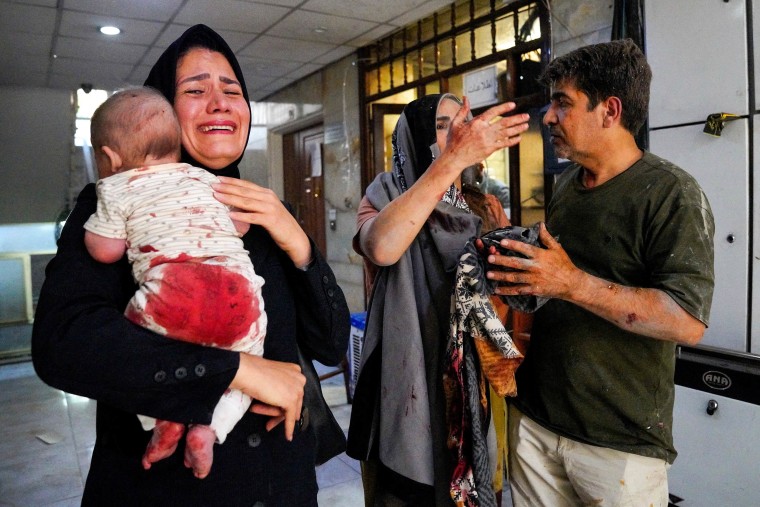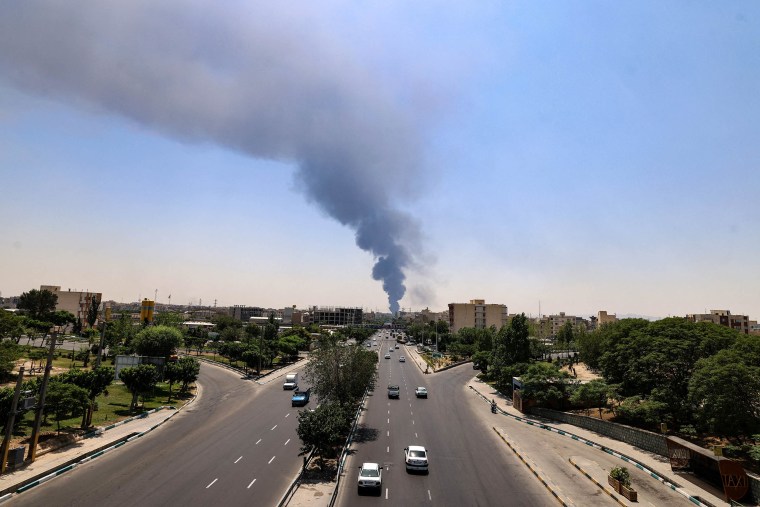DUBAI, United Arab Emirates — Israel and Iran began a fresh round of attacks on each other Monday, with the death toll mounting and the chance of a quick victory for Israel evaporating as the conflict entered its fourth day.
Responding to new Israeli strikes on surface-to-surface missile sites in Iran, Iran’s Islamic Revolutionary Guard said it had launched its own wave of missile attacks on Israel “with greater force and intensity than before.”
Israel, which launched the latest conflict Friday, said it had achieved “full aerial superiority” over Iran’s capital, Tehran, likening the conditions to its dominance over the Gaza Strip and Lebanon. At least 224 people in Iran have been killed since Israel’s initial attack Friday, Iranian state media reported, while 24 people have been killed by Iran’s retaliatory strikes against Israel.
Israel says its military campaign is aimed at dismantling Iran’s nuclear and ballistic missile programs, citing the “existential threat” it would face if Iran were to develop an atomic bomb.

Speaking to Parliament on Monday, Iranian President Masoud Pezeshkian said Iran is not seeking nuclear weapons but has the right to pursue nuclear energy and research, repeating its long-standing official claim.
The escalating conflict is looming over President Donald Trump, whose administration had urged Israel to hold off on the attack as it pursued nuclear talks with Iran that have since been called off.
“I hope there’s going to be a deal. I think it’s time for a deal, and we’ll see what happens. But sometimes they have to fight it out,” Trump told reporters Sunday before heading to Canada for a summit of the Group of Seven major economies, where the Israel-Iran conflict will be high on the agenda.
The United States has distanced itself from the Israeli military campaign, saying it was carried out unilaterally. But Trump gave Israel tacit approval and provided limited intelligence and other support, multiple current and former U.S. officials told NBC News, though he rejected an Israeli plan to assassinate Iran’s supreme leader, Ayatollah Ali Khamenei.
Israeli Prime Minister Benjamin Netanyahu told Fox News on Sunday that the U.S. and Israel have been “fully coordinated” on the attacks, and that American pilots are shooting down Iranian drones and U.S. air defense systems are helping to protect Tel Aviv.
The U.S. has warned Iran, which says Israel could not have carried out the attack without U.S. assistance, not to target U.S. personnel or assets in the region.
The Israeli attacks have dealt a major blow to Iran’s military leadership, as well as its nuclear program. The Israel Defense Forces said it had killed at least nine of Iran’s nuclear scientists and experts, and Iran also confirmed the deaths of its two top generals.
Rafael Grossi, director of the International Atomic Energy Agency, said Monday that there had been no additional damage at Iran’s crucial Natanz uranium enrichment facility since it was attacked by Israel on Friday, and that the level of off-site radioactivity “has remained unchanged and at normal levels.”
Off-site radiation levels also remain unchanged at the Isfahan nuclear research complex, where four critical buildings were damaged, he said.
Grossi said there was no apparent damage at the Fordo uranium enrichment facility, the Bushehr nuclear power plant or the Khondab heavy water reactor, which is under construction.
But Israel targeted more than just nuclear facilities. Iran’s stockpile of ballistic missiles with warheads, estimated at about 2,000 before the current conflict, is likely to be significantly depleted, an Israeli military official told NBC News.
In the early hours of the Israeli offensive, an intelligence-led operation, aided by drones and clandestine agents who had deeply infiltrated Iran, also targeted Tehran’s rocket launchers and leadership, according to a Israeli government official briefed on the matter who cannot speak publicly about intelligence.
Information about a gathering of Iranian commanders was used to kill key military leaders and disrupt Tehran’s command and control structure, the official said, echoing Israel’s strategy behind the exploding pagers that in September killed or wounded much of the top leadership of the Iranian-backed Lebanese militant group Hezbollah.
Despite the tactical success of the first few days, the “job is not done,” an Israeli military official said.
“Iran was worked for decades to disperse their nuclear program, to put it underground, to put it in different sites to try and hide it,” the official said.

Before Israel’s offensive, experts had warned that the only way to destroy the Fordo enrichment facility, which is buried deep inside a mountain, was with a 30,000-pound bunker-busting bomb dropped from a B-2 stealth bomber, a munition and plane possessed only by the United States.
After reports of explosions at Fordo over the weekend, Behrouz Kamalvandi, spokesperson for the Atomic Energy Organization of Iran, was quoted by state media as saying, “We had already moved a significant part of the equipment and materials out,” suggesting an effort to put Iran’s uranium out of Israel’s reach.
Israel may have broader goals, however, with Netanyahu saying Sunday that regime change “could certainly be the result, because the Iran regime is very weak.” On Friday, he addressed the Iranian people directly, saying in a televised statement that “This is your opportunity to stand up and let your voices be heard.”
Far from capitulating, so far the Iranian regime is appearing to fight back. On Monday, the semiofficial Fars news agency said that a man convicted of spying for Israel’s Mossad intelligence agency had been executed.
“The enemy cannot remove us and the nation from the scene by beating, killing and assassinating,” Pezeshkian told lawmakers. “Because for every hero whose flag falls, there are hundreds of other heroes who will take up the flag.”
